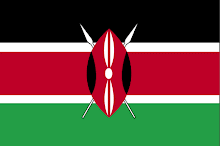History since Independence....
In 1963, the year of Kenyan independence from the British, Jomo Kenyatta representing the Kenya African National Union (KANU) formed a government and in 1964 was elected president. During his presidency, Kenyatta was able to spark the economy and stabilize the politics of Kenya. However, when he died and Daniel arap Moi became president, Kenyatta’s major achievements were reversed. The economy suffered stagnation and politics a loss of democracy. For example, Moi ruled under the pretenses of a one-party constitution and a mlongo system of voting developed: a system in which voters line up behind the candidate they are voting for, and thus suffer a loss of political privacy. Also, under Moi, ethnic tensions flared, especially between the Kalenjin tribe (to which Moi belongs) and the Kikuyu tribe. Growing dissent, even from the international community, led to a movement for constitutional reform, especially for the abolishment of the one-party system. However, Moi was still able to dominate politics, even in multi-party elections, so in 2002, he was banned from running. Mwai Kibaki won the election of 2002, representing the democratic National Rainbow Coalition.
Kenya Now...
The progression of Kenya since its independence has been continually inhibited by corruption and a limited economy. Expectations for Kenya’s future were bright as the country set up a democratic republic 2002, holding open democratic elections and peacefully transferring power from the Kenya African Union, which had held power in the country since its independence, to the National Rainbow Coalition, which represented a coalition of political parties. Under the presidential rule of Mwai Kibaki, the country took esteemed steps towards a better economy and a more stable position in world politics and economics. Kibaki passed the Second Education Program, granting free education to Kenyan youth, and there grew a general consensus that the Kenyan people had gained greater freedom of speech and greater freedom of press under his rule, evidence of a true democracy. However, in 2006, two major incidents involving political corruption became public. The first led to the resignation of three Kenyan ministers, and the second, only a few months later, involved tax evasion and money laundering in the country’s banking system. No explanation was every given by the government, and no one was ever held accountable.
All of this progress came to a staggering halt with the December 2007 presidential elections. President Kubaki ran for re-election against the Orange Democratic Movement (ODM) candidate Raila Odinga. After a tight race, Kubaki came away with a win under substantiated claims by EU observers of poll rigging. The controversy set the country into massive outbreaks of violence, particularly along ethnic lines. The Kikuyu tribe had dominated Kenyan politics, through the Kenya African Union, and business since the country’s independence in 1963. Kubaki was also of Kikuyu descent, and when news came of the scandal revolving his re-election, and when he refused to resign from his position as president following it, mobs of other ethnic Kenyan tribes began attacking the Kikuyu in mass, virtually chasing the entire tribe out of the country. People have gone so far as to hunt down Kikuyu with bows and arrows, axes, etc., leading to a mass exodus of the tribe. For over two months the conflict remained unresolved, with thousands of Kikuyu camped out at police stations or stranded in neighboring countries, and more than 1,000 dead as a result of the continuing genocide. Kenya contains more than 40 ethnic tribes, and tribal conflict is nothing new to the country. However, since its colonization, much of this conflict had been subdued. The tension still existed, but under the surface of the country. However, the controversy surrounding the December 2007 elections brought all of that tension back to the surface, leading to more violence and chaos than anyone had predicted from the once promising new democracy. However, just recently on February 28, 2008, the Kenyan government finally announced a solution to end the violence. Kubaki will remain the President of Kenya, but his oppositional leader, Odinga, will become Prime Minister, with the power to “coordinate and supervise” the government. Only time will tell how this agreement will work out. Unfortunately, it is expected to be years before tribal tensions calm down again. The tensions between Kenya’s tribes far preceded the 2007 election, and the elections only served to reignite them. Therefore, it isn’t expected that a cultural truce will immediately follow the political one.
Economically, Kenya has continually battled poverty and food insecurity throughout its colonial era to the present. During its colonization, Kenya was essentially robed of control over all of its natural resources, leaving Kenya even after its independence with an economy primarily controlled by foreign investors. The people of Kenya were forced to rely heavily on agriculture for support and, even today, Kenyans are primarily concerned with internal consumption rather than export for profit, with the cash crop of the coffee bean being the sole exception. The violence following the 2007 election virtually paralyzed the country’s economy, but hopefully the new resolution to the political conflict will bring back hope to the Kenyan people regarding their country’s future.
Thursday, February 28, 2008
Subscribe to:
Post Comments (Atom)

No comments:
Post a Comment